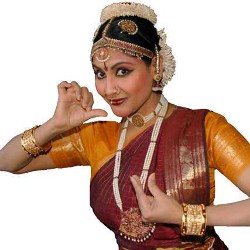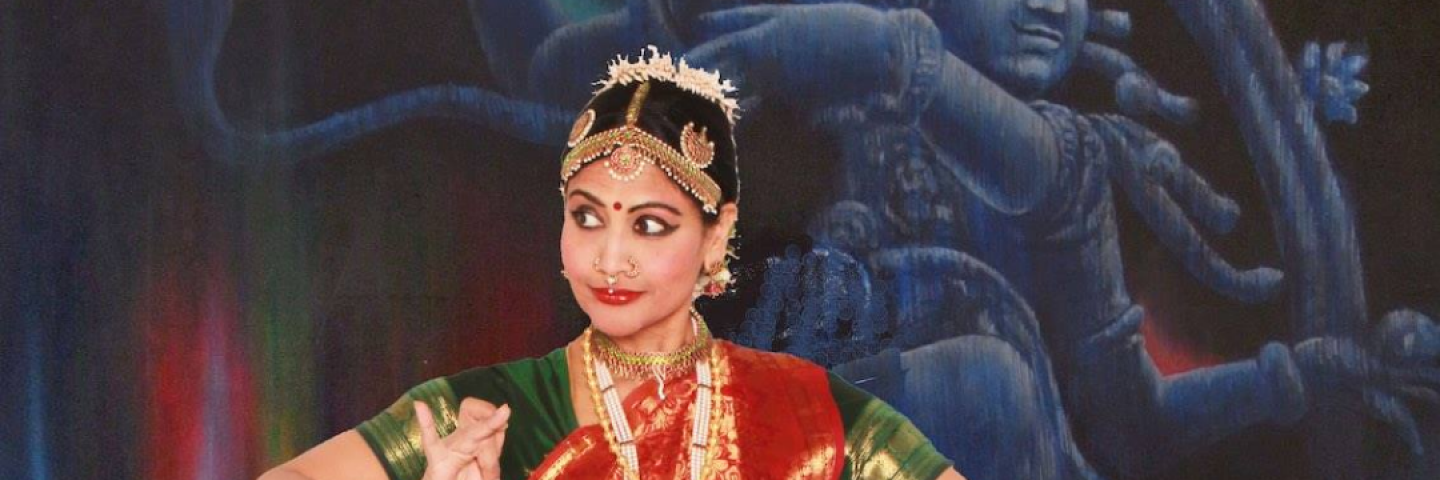 | Traditional Skill/Art Craft: Bharatha natyam dancer and teacher Years Awarded: 2015, 2018, 2020 Contact Information: Phone: (503)830-0496 Email: jayanthiramanpdx@gmail.com Website: https://www.jayanthiraman.com/ |
ARTIST BIOGRAPHY
Jayanthi Raman is an acclaimed performer, choreographer, and master teacher of the classical Indian dance form Bharatha natyam. For more than four decades, she has performed and toured in US and internationally, reaching wide audiences, some of who had never seen this genre of art.
In addition to teaching at her school Natya, Jayanthi has served as an assistant professor of dance at Portland State University, becoming the first Indian dance faculty member in the Pacific Northwest. She is the author of two books on Indian dance and has presented lectures and master classes across the nation, including at the University of Washington, Reed College, George Washington University, University of Vermont, and Central Washington University.
Jayanthi is the recipient of the Oregon Arts Commission's Fellowship (2015) and a seven-time recipient of the Traditional Master Artist award from the State of Oregon (1996, 2015, 2018) and the state of Washington (2003, 2005, 2009, 2010). She was nominated for an NEA National Heritage Fellowship (2017) and the USA Fellowship award (2018). She was the first artist of her genre to be awarded a National Dance Project NEFA-NDP award, and her work has been funded by The Doris Duke Foundation, The National Endowment for the Arts, The American Library Association, and The Oregon Council for Humanities.
Jayanthi has choreographed over 30 full-length dances and 600 individual and group works. Her work covers traditional as well as social themes, including immigration and women's rights. Her dance company has performed at Symphony Space-New York, Flynn-Vermont, Lied-Nebraska, Rialto-Atlanta, Wortham-Houston, Schnitzer-Portland, UW World Series-Seattle, Listner-Washington DC, and elsewhere.
"For Indians, this dance and music is part of our everyday lives, as it is intertwined with the social customs and festivals celebrated," Jayanthi said.
APPRENTICE BIOGRAPHY - Lavanya Mohanraj 2020
Lavanya Mohanraj was born in the city of Chennai in the state of Tamil Nadu in South India. In addition to her passion for classical dance, folk art traditions, and Bharatha natyam, Mohanraj has studied Tamil language and literature in India. She also studied the ‘parai,’ a folk dance and percussion form that has been marginalized in Tamil Nadu.
Lavanya now teaches the Tamil language and ‘parai’ folk dances to local children in Oregon. Their performances have won accolades and awards at dance competitions in the local community. She stays actively involved as a performer, teacher, and choreographer in cultural events in Portland and is a prize-winner of the Greater Portland Tamil Mandram event for the categories of Tamil Folk Dance with Parai Instrument (2019) and Contemporary Dance (2018). She aspires to become a senior performer/teacher to inspire the younger generation to learn Bharatha natyam.
APPRENTICE BIOGRAPHY - Asha Pantula 2018
Asha Pantula is an Indian American and a first-generation American in her family. Being a first-generation American she feels that learning Bharatanatyam not only helped her learn about her cultural heritage and connect with her family but has given her confidence and pride in herself and her heritage. She began learning Bharatanatyam when she was five years old and after moving to Oregon has continued learning from Master’s Dr. Ramya Raman and Dr. Jayanthi Raman. She will learn Nattuvangam to develop a deeper understanding of the rhythmic structures of this traditional Indian dance. Her goal is to teach the younger generations around Corvallis.
APPRENTICE BIOGRAPHY - Bakul Godbole 2015
Bakul Godbole is from Maharashtra before moving here to Portland, Oregon. Before moving she studied Bharatha Natyam classical dance in India and now studies with Dr. Raman at the Natya Dance Academy as both performer and trainer.
Q+A WITH THE MENTOR ARTIST
Describe your traditional art.
Body
I am a practitioner, teacher, and choreographer of the classical Indian dance Bharatha natyam for past four decades. I started performing since my childhood years and teaching since my teenage years. My move to the US, Portland brought me into a new realm twenty-two years ago. I worked hard to establish as a serious traditional artist never compromising my art form and maintaining its purity and authenticity, yet I was creative enough within the boundaries to be dubbed as a contemporary performer and choreographer by the National Press.
Teaching is my passion and I firmly believe that the generosity of a teacher is the only way an oral art form like classical dance can survive and prosper, preserved for future generations. I was the first artist in my genre to receive awards for my work over the years. Although accolades such as ‘cultural treasure’, ‘gold standard of Indian dance in the Northwest’ and ‘scholar’ etc., are rewarding; my true passion still is teaching the next generation of young dancers locally and continuing this tradition for future generations.
How did you come to learn this tradition?
Body
I had the good fortune and honor of learning from renowned guru of Indian classical dance in India, since I was four years old from Guru J. Venkatachalapathy of Kalakshetra and continued later under Guru Adayar Lakshman who is considered synonymous with the art form. He not only is a scholar of dance but also a renowned musician, who has students all over the world. In addition to dance, he is well versed in the theory, percussion, and history of dances, which he generously shares with his students. He has received the highest titles and awards for his contribution to the field of classical dance in India.
I studied dance and music for 14 years under his guidance and then started teaching at his institution. I had the fortune of staying in Gurukulam for a year to study the art form in depth from him. The traditional method of teaching in India is the Gurukula system (guru – teacher, kula – family). The Gurukula system involved living with the teacher as if the student was part of the family. Studying this art is part of an oral tradition. Education is a dynamic process, imbibed through living, traveling with the guru (teacher).
Why is this cultural tradition important to your community?
Body
Requiring many years of training before a dancer is ready to perform; Bharatha natyam is an art form that relies heavily on the teacher-student bond in preserving and perpetuating the accumulated knowledge of the part. The dance is passed down through generations from teacher to student, without a formal notation, as the nuances are only appreciable and learned by seeing the master artist perform.
For Indians, this dance and music is part of our everyday lives, as it is intertwined with the social customs and festivals celebrated. I have been practicing the art form in lifelong pursuit, and the apprentice not only learns the art form but also its history and value in its cultural aspect and significance in the overall tradition in India. The tradition of this art can then be passed on to younger generations in the east Indian community and to the general public through performances.
Experience/Honors
Body
Some Artistic highlights of four decades of work:
• Received ‘Arts Advocate’ award from BMK Trust, Chennai, India 2019
• Nominated for the US Artist Fellowship Award 2018
• Nominated for the NEA National Heritage Fellowship Award 2017
• Oregon Arts Commission – Individual Artist Fellowship award 2015 (first artist of her genre)
• 2015-16: Assistant Professor of dance at Portland State University – First Bharatha
Natyam faculty position in Northwest and first Indian dance faculty in Oregon
• Author of two books on Indian Classical Dance published May 2015, sold over 450 books locally and online
• Invited Speaker at many local and community events about dance, culture, mythology, music and allied topics.
• Traditional Master Artist Award of excellence in teaching, TAAP award, for seven years from OR and WA (as an out of state master artist):
University of Oregon Folklife Program: Master Artist Award for Teaching artist of Excellence: 2019, 2015, and 1996
Washington State Arts Commission: Master Artist Award for Teaching artist of
Excellence – rare honor as an out of state Master artist, and awarded for four
years: 2010, 2009, 2005, and 2003
Visit OFN's Culture Keepers Roster to learn more about the artist.
Traditional Arts Apprenticeship Program
More OFN programs
OFN main page
